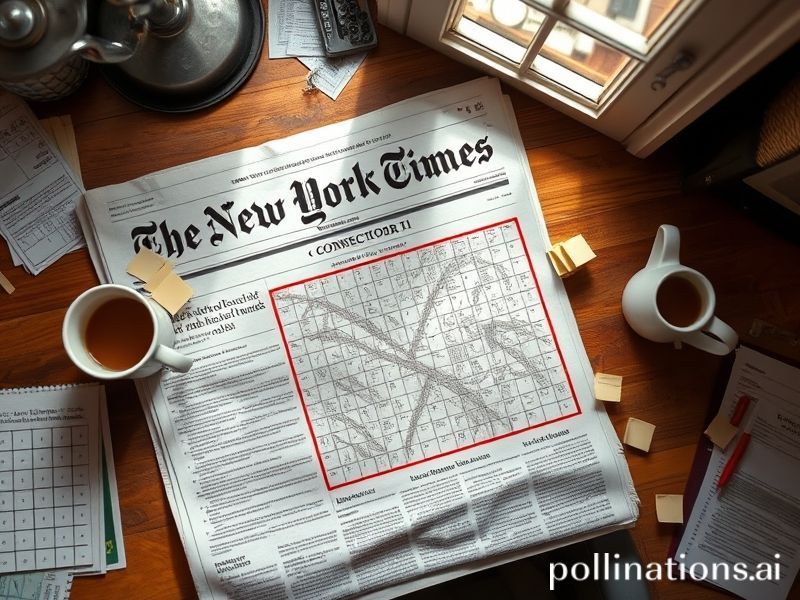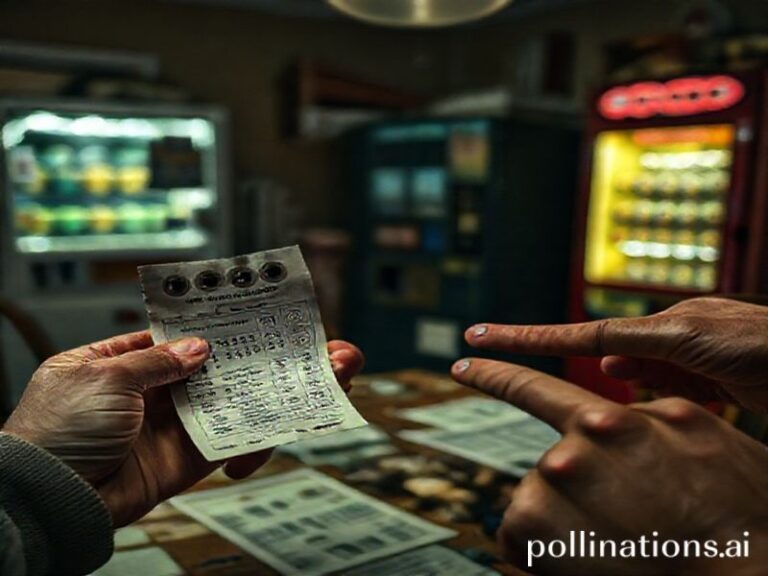Global Eye-Roll: How the NYT Connections Puzzle on 9/11 Became the World’s Most Awkward Icebreaker
The New York Times’ daily puzzle, Connections, usually serves as a harmless, caffeine-free stimulant for the globally scattered knowledge-worker class. Yet on the morning of 11 September—date already overloaded with symbolism like a suitcase past the weight limit—those four innocent columns of words became a miniature geopolitical flashpoint. From Lagos to Lisbon, solvers noticed that the “hints” (the paper’s coy breadcrumb trail) felt oddly… pointed. Category titles such as “Flight Paths,” “Unexpected Landings,” and “Things That Collapse” had the subtlety of a drone strike. Cue a thousand group chats lighting up faster than a currency flash-crash.
In Nairobi, my friend Aisha screenshotted the puzzle and added the Somali proverb: “When the hyenas laugh, check your goats.” Translation: if the universe is winking, something’s probably bleeding. Half a world away, a Berlin barista told me he solved it between orders, muttering that the only connection left was “collective trauma as a subscription service.” The Times, ever the discreet capitalist, didn’t apologize; it simply updated the online hints to read “architectural failures” and “aviation jargon,” proving that historical airbrushing can occur in real time and for only $1.25 a week.
International newspapers picked up the ripple. Le Monde ran a short item under the headline “Quand les mots s’effondrent,” noting that even French existentialists might find the coincidence “un peu too much.” In Delhi, the Hindustan Times used it as a springboard for an op-ed about how America exports not just fast food and drone diplomacy but also anniversaries packaged as wordplay—ready for import, assembly required, batteries not included. Meanwhile, China’s Global Times sniffed that the incident revealed Western “moral fatigue,” apparently forgetting that its own state media once commemorated 9/11 with a fireworks GIF.
Why does any of this matter beyond the dopamine economy of blue-checked Twitterati? Because the episode crystallized a truth we usually bury under think-tank PDFs: globalization hasn’t flattened memory; it has just given everyone Wi-Fi-enabled mirrors in which to watch themselves grieve, smirk, or sell ads. The same algorithmic hand that recommends mango-scented shampoo also nudges you toward a vocabulary puzzle that, on one particular Wednesday, reminds you the planet still has scar tissue. The scar tissue is now monetizable, searchable, and—thanks to the EU’s new Digital Services Act—probably taxable.
The broader significance lies in how a five-minute grid game can act as a seismograph for international mood swings. Tokyo’s market opened lower that day, not because of the puzzle per se, but because enough traders saw the hints and thought, “Great, the Americans are commemorating again; expect volatility in defense stocks.” In São Paulo, a crypto-pundit live-streamed his solve, overlaying it with NFTs of collapsing towers—art, commerce, and necropolitics in one tidy ERC-721 token. And in Kyiv, where real towers still crumble, a journalist friend laughed until she coughed: “Your newspapers make a game of our nightmares, then sell the DLC.”
Dark humor, yes, but also a diagnostic. When memory becomes modular—plug-and-play, swipe-to-reveal—the world gains a shared language that is simultaneously intimate and alienating, like a condolence card written by AI. The Times insists the overlap was “coincidental,” which in 2023 is just corporate Latin for “algorithm we’d rather not audit.” Still, the incident did provide one genuine public service: it reminded the planet that the past is never past; it’s just waiting for the next push notification.
So, dear reader, the next time you tap “Play” on that innocent pastel grid, remember you’re not merely hunting synonyms. You’re participating in a planetary séance where every word might be haunted and every hint encrypted with history. Solve quickly, because tomorrow’s puzzle could be about pandemics, pipelines, or the inevitable heat death of the gig economy. And should the categories one day read “Fallen Empires,” “Last Flights,” and “Things We Pretend to Forget,” try not to act surprised. After all, the house always wins—even when the house is made of newsprint and nostalgia.







